The high score obtained by Emmanuel Macron on April 24 should not be misleading. Or rather if: its 57.8% form the ultimate bulwark against the populist temptation that threatens the country. They are the cache-sex of a “breathless” France, to use the expression of Sylvain Fort, of a multi-fractured country. It is no longer France, but the France who have spoken, in a movement of fear and anger. Sometimes membership. The France of young people and that of seniors, that of urban dwellers and that of peri-urban people, caregivers and tobacconists, farmers and traders, executives and civil servants, the lost and bankers, startupers and delivery people…
Paradoxical observation for this young president, so brilliant and yet so unexciting, at the dawn of his second five-year term. Admittedly, Emmanuel Macron did not fail, since he showed that the rejection of the outgoing president in the absence of cohabitation, fatal to Nicolas Sarkozy or Valéry Giscard d’Estaing, was not enough to elect anyone, and especially not the representative of the extreme right. And from Washington to Berlin via Rome or Brussels, we breathe better since the re-election of Emmanuel Macron. Because as in 2017, the hypothesis of a victory for Marine Le Pen had aroused a fear shared throughout the world of seeing France switch to devastating populism. Undoubtedly, the essential is there: “Macron had to win this election, which represents a major stake for France, but also in the world”, summarizes Gideon Rachman, editorial writer at the FinancialTimes.
As in 2002 and 2017, the French refused the worst-case scenario, while playing at being scared. But how much longer will they resist what Etienne de La Boétie called “voluntary servitude”? How to prevent this curve of radicalization from continuing its dangerous progression, with the risk of breaking all the glass ceilings by opening the alley of power to its representatives?
We must return to Emmanuel Macron, and what he did not do, to better understand the extent of what awaits him. We must reread his words spoken on the evening of his election, May 7, 2017, in front of the Louvre pyramid. “I will do everything in the next five years so that [les Français] no longer have any reason to vote for the extremes. […] I will gather and reconcile because I want the unity of our people and our country […]. I know the divisions in our nation that have led some to extreme voting. I know the anger, the doubts, the anxiety that some have expressed.” So many statements of failure five years later. The Waterloo of LR and the PS has only precipitated the breakdown of parties and the radicalization of voters .
More than words, the country needs action. Priorities abound. The war in Ukraine but also its deleterious effects on purchasing power. The return of inflation, and the prospect of a rise in rates while the country’s debt has never been so high. The climate transition, as urgent as necessary. The famous pension reform, on which we quibbled a lot, without ever implementing it. None of these projects should be delayed. But at the top of the pile, there is an urgent need to rethink the political and social ties that weave the country. Recreate the conditions for forming a nation, in the sense that Ernest Renan understood it, by reconnecting with “the desire to continue to live together”. To press the stop button of the terrible centrifuge, which, for three decades, has projected the French towards the extremes. Relearning the common, the strength of the bond, the legitimacy of an election, the fragility of a democracy, civic responsibility, the wealth of a nation. Be silent, and listen to the French. There are five years left to change political behavior. Listen to elected officials. Mayors, national or regional representatives. Deverticalize the country, dejupiterize the Elysée, rebuild a political life anchored in the reality of the French. The “whatever the cost version 2” that the executive is preparing will certainly be welcome to heal the wounds of the purchasing power crisis. But neither food checks nor fuel allowances will be enough to fix the broken democratic machine. This requires a vision, a path, but also a dialogue and concessions. Everything that was so lacking during this failed election campaign. So that frustration does not turn into popular anger. We have seen how in the United States, Great Britain or Italy, this same rage has led the populists to power. A scenario now more than likely in France. Unless Emmanuel Macron transforms his electoral victory into a tremendous opportunity for the political transformation of the country. In 2017, he was the lucky president; it becomes, in 2022, that of the last chance.
